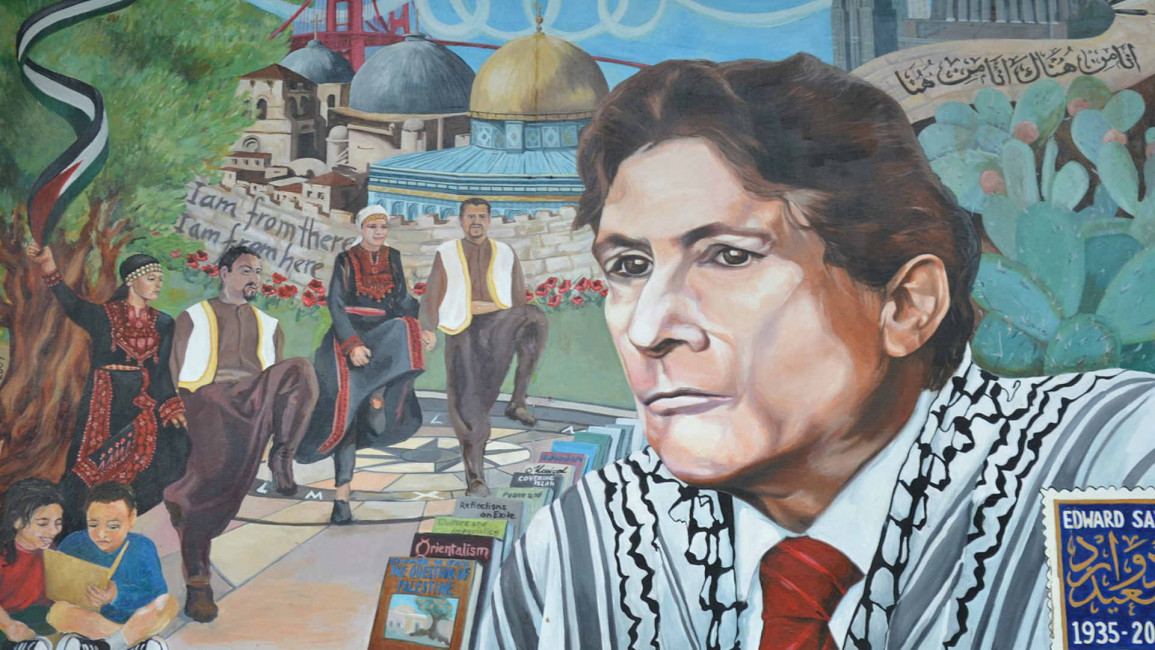
Edward Said: The legacy of an exile
Yet perhaps nothing defines Said better than his role as a public intellectual who strived his whole life to speak truth to power.
Whether rallying against American militarism in West Asia, popularising the Palestinian cause in American academia or voicing fierce criticism of Yasser Arafat and his Oslo debacle, Said always analysed everything with meticulous alertness and, in his own words, the gaze of an exile.
Born in 1935 and spending his early childhood in British-mandate Palestine, Said was sent to school in Cairo and subsequently moved to the United States for higher education. Meanwhile, the Said clan, like hundreds of thousands of other Palestinians, lost their home in the Nakba catastrophe. Said had to grapple with this sense of loss throughout his life, maintaining that, afterwards, he never felt at home anywhere.
Twitter Post
|
During his career, spanning more than 40 years of teaching in some of the world's most prestigious academic institutions, Said published multiple works. None, however, made a more defining impact than his magnum opus - Orientalism.
Published in 1978, the book laid the foundation of what is now known as the field of postcolonial studies. In this groundbreaking text, Said lays out how the situation of supposed Western superiority over the East is maintained through the application of clichéd discourses and prejudices.
Orientalism influenced a whole cohort of writers and critics in the formerly colonised world and inspired them to reverse this patronising Western gaze.
Said's political activism, mainly for the Palestinian cause, also made him a controversial figure in American academic and political circles. Ludicrously calling him the "Professor of Terror", Edward Alexander once wrote in Commentary Magazine that being an unhindered advocate for the rights of Palestinians made Said an "ideologue of terrorism".
This didn't stop Said from discussing the historical injustices that Israelis have inflicted upon the Palestinians and the Palestinians' right to seek justice.
Resigning from his formal executive position on the Palestinian National Council in 1991, Said later changed his stance from supporter of a two-state solution for the Palestinian-Israeli conflict to seeking one state with equal rights for both people.
Realising the irreconcilable disparity of power between the two sides, his predictions on how disastrously the Oslo process would unravel proved to be prophetic.
More than 24 years after the signing of the Oslo Accords, Palestinians still live under a pervasive military occupation, the question of refugees is far from solved and Israelis continue to colonise more Palestinian land each day.
 |
Said would have been deeply disturbed by the fact that many public intellectuals, particularly on the left, blindly rallied in support of Assad in Syria |  |
At the time, Said's opposition towards the Arafat-led Oslo process made him deeply unpopular - but there is now an increasing agreement on how the Accords have reached a dead end.
Said's unmatched quality of grappling with the realities of the world beyond the binary lens of "ours" and "theirs" was a powerful instrument to overcome hate, prejudice and tribalism that continues to challenge the contemporary world.
Said would have been deeply disturbed by the fact that many public intellectuals, particularly on the left, blindly rallied in support of Assad in Syria - despite the crimes committed by his regime against its own people.
|
Read more: Jack Shaheen, a powerful voice against Arab stereotypes in popular culture, dies at 81 |
|
Always outspoken
After battling bravely for more than a decade with leukemia, Edward Said left us on September 25, 2003, at an age of 67 years. But as a fierce critic of the "ivory tower" nature of academic discourse, paradoxically, Said's intellectual legacy remains largely confined to the circles of academia.
His work and method, however, needs to move beyond the confinement of academia and into the realm of public discourse.
Said can not only prove to be remedial for the increasing polarisation and vengefulness of contemporary politics but also help us to create a new ideology of inclusivity based on mutual recognition and respect.
Umar Lateef Misgar is a political analyst. His work has appeared in The Independent, Truthout.org, London School of Economics Human Rights Centre blog, and elsewhere.
Opinions expressed in this article remain those of the author and do not necessarily represent those of The New Arab, its editorial board or staff.



